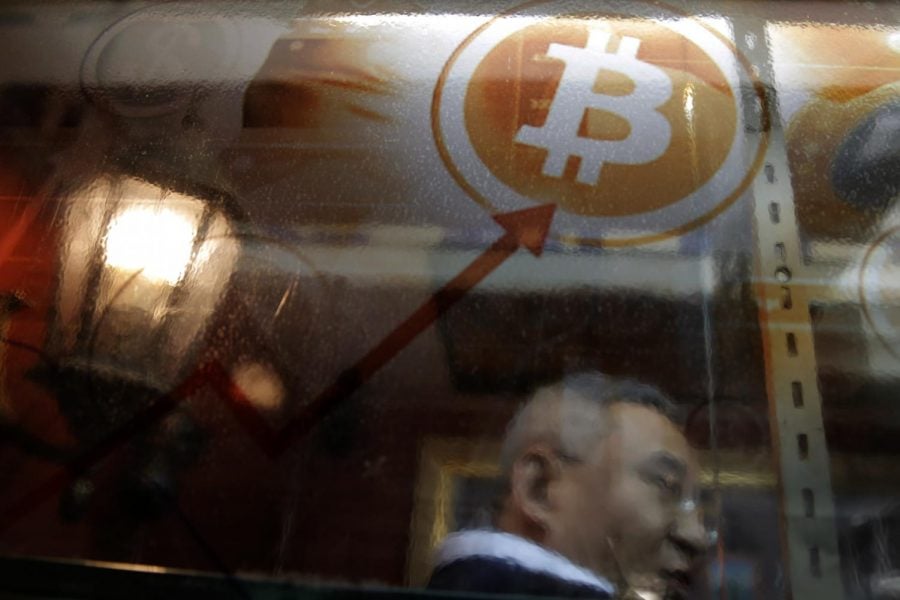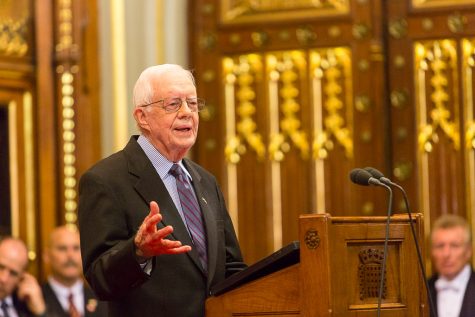Cryptocurrency is changing the financial world
If you haven’t been paying attention to cryptocurrencies, now is the time to start. Digital currencies are becoming more popular and causing a stir across America.
Bitcoin was the first cryptocurrency to emerge in America in 2010 and has become the most popular. Other currencies have followed suit, but they have not flourished with the same success. With cryptocurrency, investors can use their physical dollar bills to receive digital coins. Despite cryptocurrency’s popularity on the rise, the system’s fluctuating growth and difficulty retrieving information makes it a risky investment in the eyes of the government and financial businesses.
The government is fearful of cryptocurrency for two main reasons: the possibility of money laundering and the threat to America’s banks and currency system.
United States regulators are worried the system will promote illicit activities and money laundering. The system is decentralized, not controlled by one party and all of the information is encrypted. These conditions make it difficult to track transactions and the people behind them.
The main draw for cryptocurrency users is the fact that the system is decentralized. The digital currency has introduced a complete change in how people can conduct business and make transactions. People who were not able to do business with banks found a way with the digital currency. Users rely on peer-to-peer networks for the system to work. They enjoy using a system not controlled by the government, banks or third parties.
American banks are heavily regulated and monitored by the government. They follow strict laws when it comes to money laundering. Noncompliance can be devastating financially for banks. Because of this, banks are wary of jumping on the digital currency train. Cryptocurrencies bypass anti-money laundering regulations.

On Jan. 3, the Wall Street Journal reported that Bank of America Merrill Lynch decided to ban clients from taking part in the Bitcoin Investment Trust by Grayscale Investments. In a memo sent to financial advisers, Merrill Lynch explains that Bitcoin is “too much of a risk” for investors. Financial advisers were not allowed to pitch the offer to any clients, offer investments or makes trades for clients. The decision comes after Bitcoin’s value decreased since the start of the new year.
U.S. regulators are informing users about the risks that come with using virtual currency. The U.S. Securities and Exchange Commission (SEC) posted guidelines on their website for those interested in investing to think about. Some points include investors asking what their money will be used for and what to watch for in case of fraud. The guidelines also state that there are limited recovery options if investors do become victims of fraud.
In December 2017, SEC’s Chairman Jay Clayton said in a press conference that there will be more law enforcement against internet coin sponsors if they continued to ignore security laws. This comes after the SEC froze an asset of a repeat violator from the company PlexCorps.
Even with knowing the risks, investors aren’t deterred from wanting to dabble in the digital currency world. “It’s high-risk kind of thing,” said Erick Ovalle, Illinois State University graduate. He started on BitCoin about two months ago after watching videos on it. But he recognizes it’s a risk. “Once you put the money in, you have to think of it as gone and you’re not getting it back.”
There are some businesses that have started to embrace the move to digital currency as well. Microsoft, Subway and Expedia are some places accepting Bitcoin as a valid form of payment.
“The entire industry is just growing really fast,” Erik Vorhees, ShapeShift CEO, said in an interview with CoinDesk. “I think it proves the point that I’ve been arguing a long time that cryptocurrencies are not exclusive. They don’t grow by just competing with each other. The entire industry is growing by competing with traditional finance.”













SAMIR SARDANA • Apr 24, 2020 at 2:18 pm
indians raise juvenile and supine queries and objections on money laundering and Pakistan
I present the largest money laundering operation in the world sponsored by a state
The Hindoo Notebandi
The Demo Scam – which no Indian Newspaper reported – as they were all paid off – as they are of the ilk of the Brahmins and Banias.dindooohindoo
It is the disaster of the Brain of Narendra Modi !
Part 1
Conversion Route (Elementary Level – rest to be submitted at the CIC Hearing)
• Party A has Rs 1 crore of Old Cash (which is obviously unaccounted) and the choice of paying tax and interest thereon has lapsed as there is no VDIS – and post Demo the deemed tax is 100% at the minimum
• Party B (Stage 1 Converter) has Rs 65 lacs of New Cash – which is given to Party A in lieu of the Old Cash of Rs 1 crores which is then given to Party C to X as under:
o Party C to X (Stage 2 Converter) are legal entities who trade in Nil VAT/ST products (or under Exemptions and /or Compounding) and are POS Retailers who then , make manual or backdated E-Bills for fictitious sales of items to unknown individuals and deposit the new cash into the bank
o Party C to X deposit the cash in banks whose books are open for 30-45 days before the date of announcement of the Demo or whose IT systems allow backdating of E- Bank Statements (within the period of reporting to the RBI and other Regulators)
• Party Z then taps Party A to convert the New cash Received of Rs 70 lacs into a capital entry to clean the cash at a rate of , say 15%, wiring Rs 59 Lacs to Party A, as a capital receipt etc, and taking the Rs 70 lacs of new cash from Party A
• Party Z which is basically front for Party B – hands the cash to Party B, after charing the custodial, logistics and security charges
• Party B then resumes the same chain as in Step 2 above, wherein the rate of the conversion, id.est., 30% keeps rising as the DEMO deadline appears
• Party A can convert the Rs 50 lacs into cash – new and old – at a premium, at any time that it is required
Notes
• Since converters had the new cash within a day and as per news reports , even before the announcement of Demo, they have to be part of the establishment
o If the converters had withdrawn the new notes from the bank, the banks would have tipped off the DRI/ED etc and possibly reported to the RBI – in which case they would be raided (but were not) or they would have to explain why large amounts of cash were withdrawn (for labour wages – although wages are not paid in Rs 2000 notes , agri payments etc) and on specific dates and how/why the banks were satisfied about the same
o Hence, if the converters got the new cash o/s the Banking system – that is fraud and PROOF THAT THE CONVERTERS ARE PART OF THE ESTABLISHMENT
o If the converters got the new cash from the banks – it is proof of collusion and fraud by the bankers, as past patterns of withdrawal by bank customers (for labour, wages, agri payments etc), would not support the new notes withdrawal
• Since converters had TO TRANSPORT CASH ACROSS LOCATIONS, IT WOULD HAVE REQUIRED SECURITY OR PERHAPS STATE SECURITY, they have to be part of the establishment as
o It is impossible that the state would not be aware of the logistics and security
o It is impossible that the state would not raid the cash movement
• Since Party C to X, who would have reported drastic increase in cash sales and deposit of cash into the bank , would not be able to support the same by PAST PATTERNS OF RAW MATERIAL PURCHASES AND TRADING PURCHASES AND SUCH LARGE AMOUNTS OF PURCHASES OF RAW MATERIALS IN CASH – COULD NOT HAVE BEEN JUSTIFIED BY PARTY C TO X , W/O THE SUPPORT OF THE ESTABLISHMENT
• Cash recovered in the “form of old notes” by the “DRI/ED and the Police” – were all recovered from the “so called originators” and “so called garbage dumps”- w/o “a single case of cash recovered” from “the converters/entry operators”
• No cash was recovered from the “converters/entry operators (Party B and Party C to X, as stated above)”, who are obviously part of the establishment – which is unusual , as the operators would be having the new currency which o Is either kept in a house/safe or o Stocked in the bank (which would have tipped off the DRI/ED etc or o Transferred the cash around in new stocking points and neither of the 2 above points can happen w/o the support of the establishment
• Since the GDP is still growing on the “computation mode of GDP on expenditure mode”, and there is “no shortage of notes” of less than Rs 100,it would mean that the Industrial agglomerations typified by the SSI and the Cash sector,have been “able to convert the bank deposits”, back into cash – “obviating the purpose” of the notebandi (Rs 100 is assumed,as the wages are paid in that denomination
AJ • Jan 16, 2018 at 11:38 pm
I think you nailed it perfectly. Big banks are breathing down the governments neck because the money we trust them with (that they use to invest in hedgefunds) is now leaving the country and entering a foreign market. They don’t like when people make big financial gains with the money the worked hard for and earned. Nope, banks would rather charge you $25 a month to put your money in an account, offer a disgraceful .5% yearly interest, and if you’re lucky enough to get a credit card with them, they’ll give you a $5000 limit with a 29.99 APR. It’s disgusting these big banks, and they think by having big bad 7 figure earning CEO puppets speak out against crypto that it’s going to stop the investors and stop the growth? HAHAHA!! Fools have made a living off the working man, and now the working man wants to invest and take a potentially rewarding risk! Tax evasion you say?! When the money is converted to USD, and I assure you it will be, you’ll get your taxes. That lambo, benz, bmw, house, fancy clothes, that USA have already charged and import tax on, will be paid again when the investor becomes the buyer of fancy things. Foolish Government won’t think outside the box and see that people just wanna have fun, take a gamble, and live life. This is what happens when we give too much power to those in office. They try to take away our ability to invest OUR OWN MONEY. If they collapse this system, they’ll see a second civil war, and the money that investors made were not just buying houses and cars that they paid taxes on, but they were also buying some pretty fancy things with triggers that fire pointy things. More power to the people. Ignore the paid off critics who are also investing in crypto in hopes to keep you at the bottom. As hopsin said, they have a plot to keep you on the bottom while they’re on top! Rise above these career politician criminals and corrupt banks. Nothing backs crypto? It has a finite amount that can’t be said about the printed dollar backed by promises and the people. There is 3.5 trillion gold mined since we started mining, and our “gold standard” backs it? Yet there’s more the that 3.5 trillion in circulated money. What is backing the rest? NOTHING but lies and inflation. Let’s get it all back! Let’s be wealthy midclass and make the poor less poor, and the rich can stay rich, we’ll just join them, like the blue collared underpaid 9-5 fucks we are!